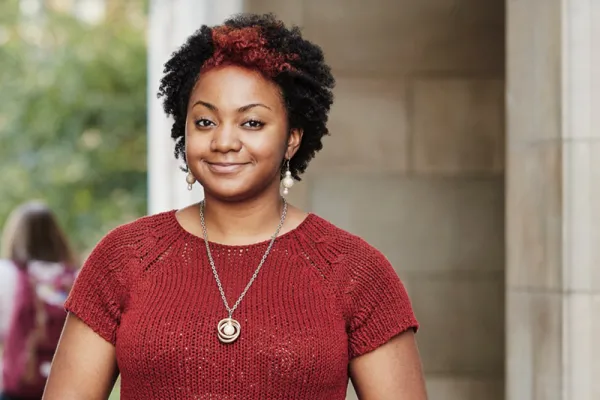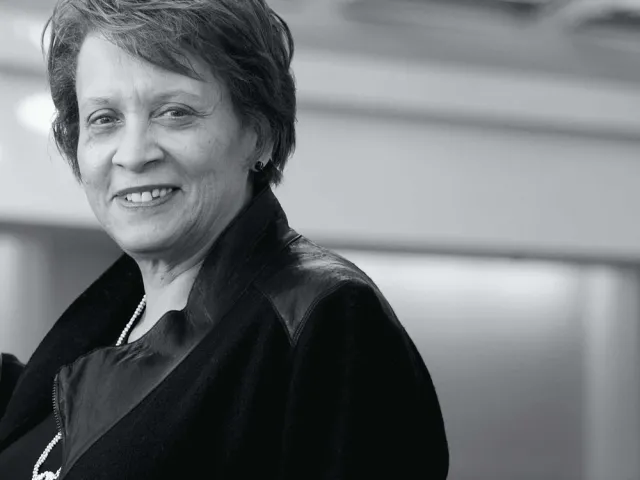A Steady and Gentle Guide
Alum News

Published December 9, 2016
Chelsea Williams ’13, Postbaccalaureate Student at Washington University in St. Louis
Major: Sociology, with a minor in applied statistics
Paula Giddings’ influential course: Feminism, Race and Resistance
Empowering lessons: “The first class I took with Paula was my first women’s history class and it had subtopics of the medical industry’s role in black women’s health. I hadn’t really heard about what black women have done except for Rosa Parks. I started going to her office hours, doing my Smithie thing, making sure my papers were OK. It was empowering to know what black women have done in all types of contexts, before slavery, during slavery and after.”
When I decided to become a doctor: “Most of my projects in school for classes were health-related. When I became a senior, I thought, ‘I really should have done premed.’ I hadn’t taken any science classes. When I told Paula I wanted to go to a conference in Chicago on correctional health, she wrote me a letter of recommendation and asked, ‘Have you ever thought about becoming a doctor?’”
How she helped me after Smith: “We kept in touch over the phone and through emails. When a $10,000 scholarship opened up, she helped me write my application essay on diversity. She really sat with my paper and helped me see that empathy was missing from my essay, the idea that doctors have to help everyone they come in contact with—it doesn’t matter who the patient is.”
What makes her a mentor: “She’s really good at keeping in touch with her students. Once you make the connection, it never breaks for her. And her encouragement is gentle—she goes out of her way to help. I could write her at 10 p.m. and she’d get back to me at 11 p.m.”
MENTOR: PAULA GIDDINGS
Elizabeth A. Woodson 1922 Professor of Africana Studies

Photograph by Shana Sureck
“Chelsea is one of those few people that have not only qualitative skills such as thinking and writing, but quantitative skills such as statistics,” Paula Giddings says. Williams made the dean’s list all four years at Smith, and during her junior year attended a statistics workshop at the University of California, Berkeley. But it was Williams’ character that helped bond the two. “She’s determined and she’s an optimist and she’s resourceful,” Giddings says, adding that she relishes mentoring her students and delights in their successes. “I’m excited that she is pursuing postgraduate medical studies—and I will help in any way I can. Mentoring is as important as teaching to me.” The only time she really had to push Williams was to encourage her to travel while she was in college. “I don’t think she had left the country before, but then she studied in England, at the University of Manchester, and once she started, she kept going—to Dublin, Florence, Rome, Paris, Spain, Morocco.” Giddings has gotten to know Williams well and understands that she is driven to help people. “Her family has faced a lot of health crises and did not always get the kind of care that they deserved,” Giddings says. “The situation made her sensitive to not only medical needs of those in marginalized communities, but how they are treated by health professionals and institutions as well.”
This story appears in the Winter 2016-17 issue of the Smith Alumnae Quarterly.
Learn More
Mentors for Life
Long after graduation, alumnae remain inspired by the professors whose classroom wisdom set them on their paths. For some, those academic ties turned into lifelong friendships.
From Advisor to Sounding Board: Laura Haynes '05 and Professor Kate Queeney
Colleagues and Co-Authors: Janine Olthuis ’08 and Professor Byron Zamboanga
Nurturing a Talent: Emily Wiest ’12 and Professor Leonard Berkman
Shared Language of Poetry: Lynne Francis AC ’10 and Professor Floyd Cheung
Thanks for Opening My World: Alumnae recall the professors whose words still ring in their ears.
Photograph by Ashley Gieseking